
Justus was the fourth Archbishop of Canterbury. He was sent from Italy to England by Pope Gregory the Great, on a mission to Christianize the Anglo-Saxons from their native paganism, probably arriving with the second group of missionaries despatched in 601. Justus became the first Bishop of Rochester in 604, and attended a church council in Paris in 614.

The King James Version (KJV), also known as the King James Bible (KJB) or simply the Authorized Version (AV), is an English translation of the Christian Bible for the Church of England, begun in 1604 and completed as well as published in 1611 under the sponsorship of James VI and I. The books of the King James Version include the 39 books of the Old Testament, an intertestamental section containing 14 books of the Apocrypha, and the 27 books of the New Testament. The translation is noted for its "majesty of style", and has been described as one of the most important books in English culture and a driving force in the shaping of the English-speaking world.

Mellitus was the first Bishop of London in the Saxon period, the third Archbishop of Canterbury, and a member of the Gregorian mission sent to England to convert the Anglo-Saxons from their native paganism to Christianity. He arrived in 601 AD with a group of clergy sent to augment the mission, and was consecrated as Bishop of London in 604. Mellitus was the recipient of a famous letter from Pope Gregory I known as the Epistola ad Mellitum, preserved in a later work by the medieval chronicler Bede, which suggested the conversion of the Anglo-Saxons be undertaken gradually, integrating pagan rituals and customs. In 610, Mellitus returned to Italy to attend a council of bishops, and returned to England bearing papal letters to some of the missionaries.
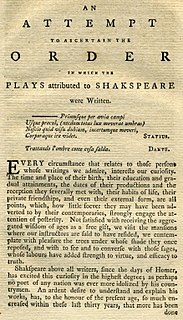
This article presents a possible chronological listing of the composition of the plays of William Shakespeare.

The Revised Version (RV) or English Revised Version (ERV) of the Bible is a late 19th-century British revision of the King James Version. It was the first and remains the only officially authorised and recognised revision of the King James Version in Britain. The work was entrusted to over 50 scholars from various denominations in Britain. American scholars were invited to co-operate, by correspondence. The New Testament was published in 1881, the Old Testament in 1885, and the Apocrypha in 1894. The best known of the translation committee members were Brooke Foss Westcott and Fenton John Anthony Hort; their fiercest critic of that period was John William Burgon.
The history of copyright law starts with early privileges and monopolies granted to printers of books. The British Statute of Anne 1710, full title "An Act for the Encouragement of Learning, by vesting the Copies of Printed Books in the Authors or purchasers of such Copies, during the Times therein mentioned", was the first copyright statute. Initially copyright law only applied to the copying of books. Over time other uses such as translations and derivative works were made subject to copyright and copyright now covers a wide range of works, including maps, performances, paintings, photographs, sound recordings, motion pictures and computer programs.
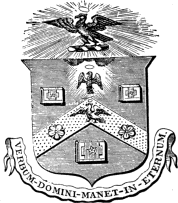
The Worshipful Company of Stationers and Newspaper Makers, usually known as the Stationers' Company, is one of the livery companies of the City of London. The Stationers' Company was formed in 1403; it received a royal charter in 1557. It held a monopoly over the publishing industry and was officially responsible for setting and enforcing regulations until the enactment of the Statute of Anne, also known as the Copyright Act of 1710. Once the company received its charter, “the company’s role was to regulate and discipline the industry, define proper conduct and maintain its own corporate privileges.”
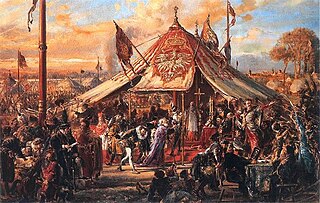
Golden Liberty, sometimes referred to as Golden Freedoms, Nobles' Democracy or Nobles' Commonwealth was a political system in the Kingdom of Poland and, after the Union of Lublin (1569), in the Polish–Lithuanian Commonwealth. Under that system, all nobles (szlachta), regardless of rank or economic status, were considered to have equal legal status and enjoyed extensive legal rights and privileges. The nobility controlled the legislature and the Commonwealth's elected king.
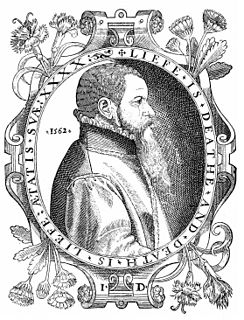
John Day was an English Protestant printer. He specialised in printing and distributing Protestant literature and pamphlets, and produced many small-format religious books, such as ABCs, sermons, and translations of psalms. He found fame, however, as the publisher of John Foxe's Actes and Monuments, also known as the Book of Martyrs, the largest and most technologically accomplished book printed in sixteenth-century England.

Sir John Frank Kermode, FBA was a British literary critic best known for his work The Sense of an Ending: Studies in the Theory of Fiction, published in 1967, and for his extensive book-reviewing and editing.
The royal sign-manual is the signature of the sovereign, by the affixing of which the monarch expresses his or her pleasure either by order, commission, or warrant. A sign-manual warrant may be either an executive act, or an authority for affixing the Great Seal of the pertinent realm. The sign-manual is also used to give power to make and ratify treaties. Sign manual, with or without hyphen, is an old term for a hand-written signature in general. It is also referred to as sign manual and signet.
Æthelgar was Archbishop of Canterbury, and previously Bishop of Selsey.
Æthelric I was an Anglo-Saxon Bishop of Selsey.

Bembo is a serif typeface created by the British branch of the Monotype Corporation in 1928-9 and most commonly used for body text. It is a member of the "old-style" of serif fonts, with its regular or roman style based on a design cut around 1495 by Francesco Griffo for Venetian printer Aldus Manutius, sometimes generically called the "Aldine roman". Bembo is named for Manutius's first publication with it, a small 1496 book by the poet and cleric Pietro Bembo. The italic is based on work by Giovanni Antonio Tagliente, a calligrapher who worked as a printer in the 1520s, after the time of Manutius and Griffo.
The printing patent or printing privilege was a precursor of modern copyright. It was an exclusive right to print a work or a class of works.

Sir Adam Roberts is Emeritus Professor of International Relations at Oxford University, a senior research fellow in Oxford University's Department of Politics and International Relations, and an emeritus fellow of Balliol College, Oxford.
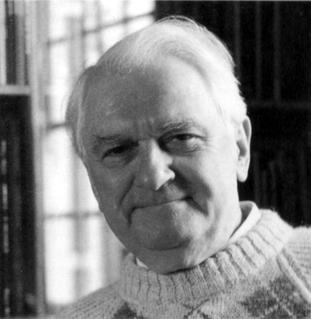
Raymond Lister (1919–2001) was an English blacksmith/ironworker, author, artist, and a leading authority on Samuel Palmer.
Events from the year 1637 in Ireland.














